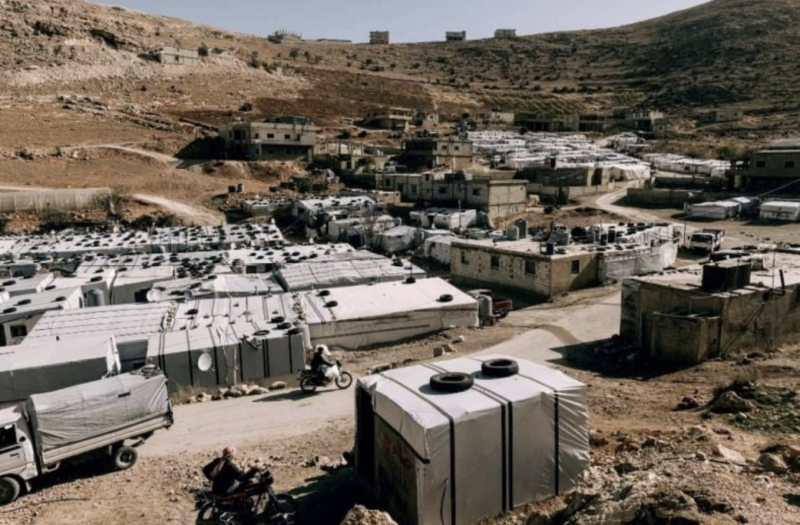
An informal Syrian refugee camp near Arsal, in the Bekaa, in December 2020. (Credit: Karine Pierre/Hans Lucas via AFP)
What obstacles to the return of Syrian refugees do you see on the Damascus side?
One needs to distinguish between economic migrants and political refugees. For the former, who continue to flock to Lebanon, the main obstacle to their return is the country’s catastrophic situation.
I don’t see how the Syrian economy can recover. There are electricity and fuel shortages, the entrepreneurs and the most qualified people have departed, and the authorities have restored their tight control over the economy. A Syrian businessman who now works as a property developer recently told me that one has to be crazy to start up a business or industry today. There are international sanctions, but they are not the primary cause of the slump.
Regarding political refugees, namely those who were part of the rebellion or simply those who lived in neighborhoods or localities that rebelled, return is impossible. Even if Bashar al-Assad promulgates an amnesty, they won’t trust him. On the other hand, they can be arrested by the intelligence services at any time and languish in prison until they pay a ransom. There are many examples here.
Finally, there’s the issue of the law of exact retaliation: The first father to return home when a member of his family had killed someone may be the victim of a vendetta. This also concerns hundreds of thousands of people. Still, domestically, those who have seized the property of those who have left do not want them to return and are capable of eliminating them or reporting them to the police.
What about the Assad regime?
Bashar al-Assad does not want to see the vast majority of Syrian migrants return from Lebanon or elsewhere. The first reason is politico-sectarian: The return of seven million Sunni Arabs would upset the balance between minorities and Sunnis in the area [of 11 million inhabitants] he controls.
Many who have left are opponents, so reintegrating them is out of the question. They must pay the price of exile, as this will dissuade those who might want to revolt again in Syria. Let’s not forget that there are four million Sunni Arabs and Turkmens in the northwest, whom he would also get rid of, but Turkey is against it, so there’s a new Gaza Strip.
As for the 2.5 million inhabitants of the northeast [including only a million Kurds], a good part of them will also be pushed to leave. These territories border Iraq and Turkey, which is fortunate for Lebanon.
Secondly, there is an economic reason. Syria is not in a position to stand the return of these millions of people. Keeping them abroad is a resource that allows the regime to survive. The million refugees in Europe send two to three billion euros to Syria every year. Those in Lebanon, Jordan, Iraq and Turkey also contribute to Syria’s survival, albeit modestly.
What does Lebanon need to do to reach a joint settlement with Damascus?
The first thing [it needs to do] is close the border to new arrivals. Otherwise, they will continue to flood in. But unfortunately for Lebanon, Assad doesn’t want the refugees to return. In the long term, it is even possible to see Damascus take advantage of the flood of migrants into Lebanon to take control of the country one day.
Is the European Union also an obstacle to this return?
The EU doesn’t want to see political refugees forced to return to Syria and end up in prison. But how [does it] make the distinction? All Syrians in Lebanon can claim that they have problems with the regime to stay, including those who went en masse to vote at the Syrian embassy in Beirut during the last presidential election.
One has to show that they are loyal [to the regime] if they want to cross the border without problems. If Lebanon decided to forcibly send back hundreds of thousands of Syrians, the EU would reduce its financial aid to the country.
But in any case, does Lebanon have the military means to send the Syrians back and prevent their return the following week? This hardly gives ground for optimism about Lebanon’s future. This mass of Syrian refugees, after more than 10 years of war at home, are settling and reproducing the Palestinian syndrome, but in a way that is worse because they are not accommodated in well-identified camps, but rather all over the country. Their demographic growth raises fears that they could become the majority in Lebanon in 20 years if the Lebanese continue to leave this way.
This article was originally published in L'Orient-Le Jour. Translated by Joelle El Khoury.